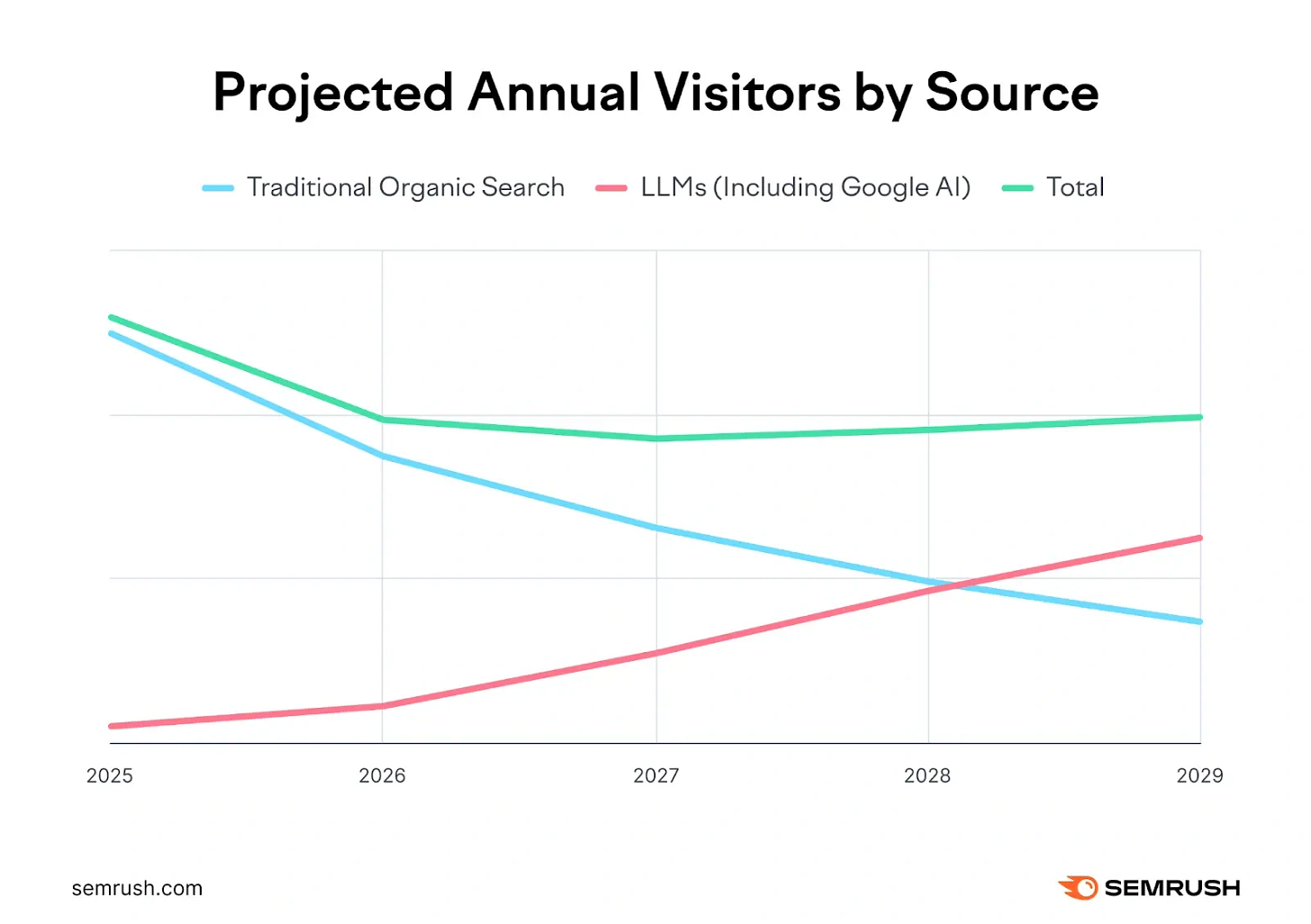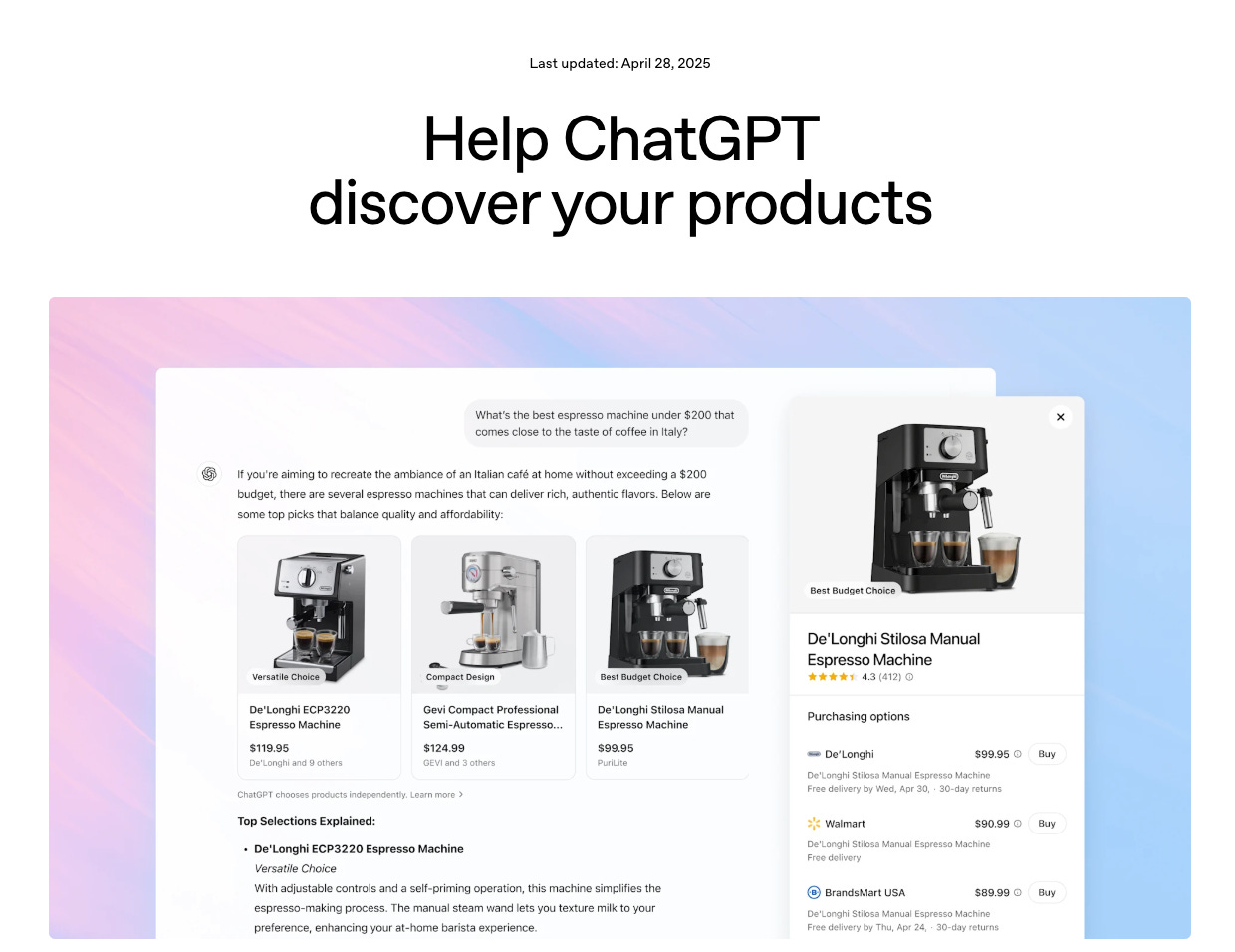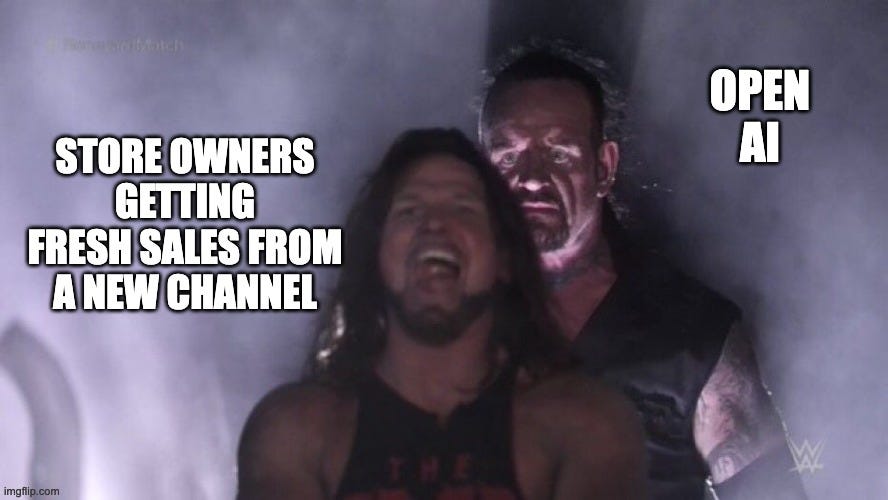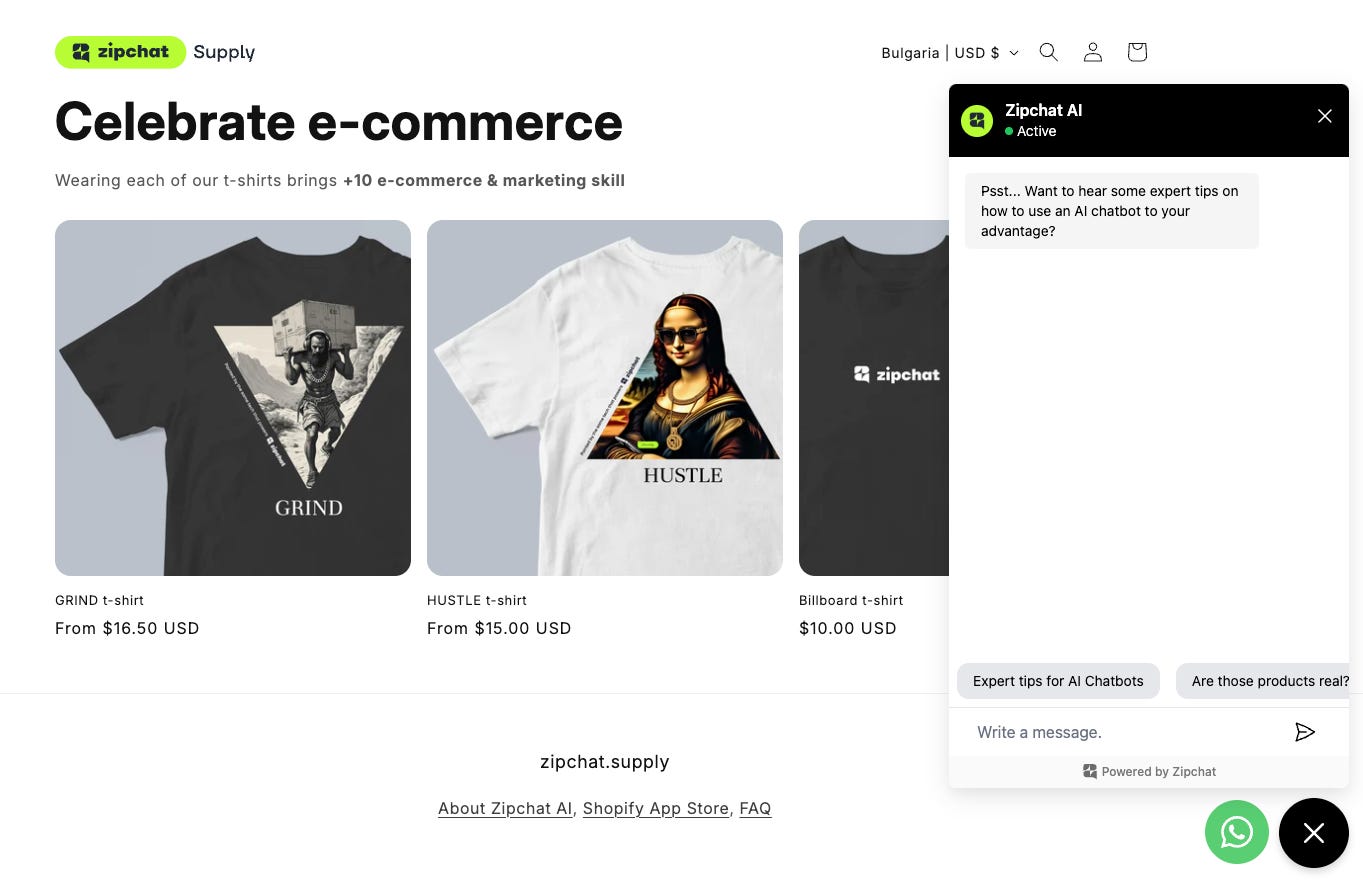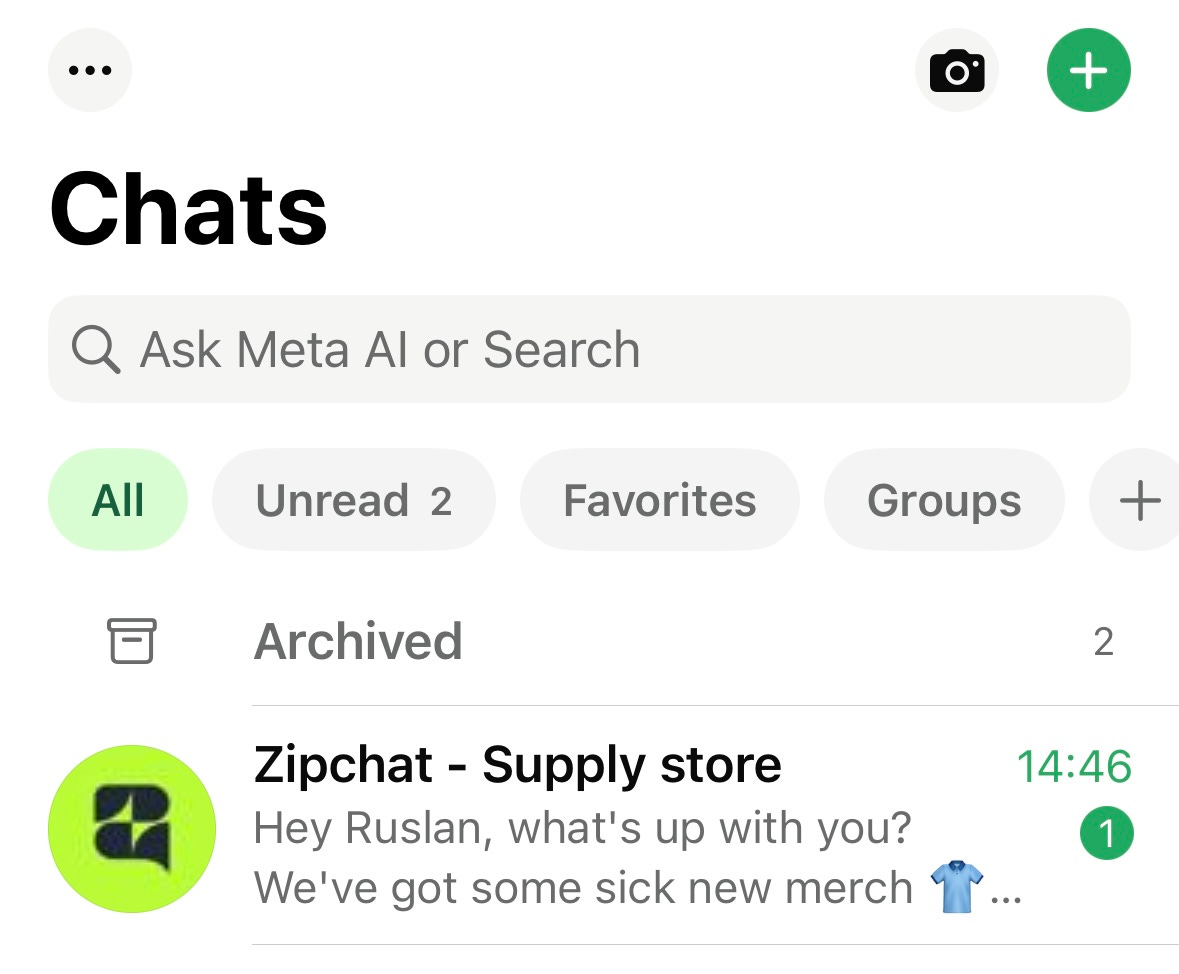ChatGPT is the new Amazon
or why it's important to fight for independent agentic commerce ⚔️
ChatGPT shopping is here ( powered by Shopify )
In case you’ve been living under a rock, it must be obvious to you that ChatGPT is steadily becoming the new “front page” of the internet:
People use ChatGPT more and more every day. They share their problems, research products, and trust ChatGPT’s opinion more than they trust themselves.
If you’re running an e-commerce store, there is no other place more important than ChatGPT for you to be at!
Say goodbye to the era of e-commerce, and welcome the era of agentic commerce 🧙
Make no mistake. Your website traffic will drop over time. And it will keep dropping. Online stores will always have their place, just as physical stores are still around, but e-commerce has passed its prime.
Ultimately, why would you go to research products yourself when ChatGPT can do it for you?
Here comes ChatGPT shopping
Recently, ChatGPT started including product links inside its interface by partnering with Shopify. When you look for a product on ChatGPT, it’s going to take your personal context ( where you live, for example ) and start recommending things to buy.
If you’re using Shopify, your products should already be inside ChatGPT, and you should be seeing new sales flowing. 💸
It won’t be long until you can buy directly from the ChatGPT UI, without even visiting the website.
ChatGPT is a great channel, but what’s the hidden cost?
The ChatGPT commerce launch reminds me of the 2010s battle for e-commerce.
Although nowadays it seems clear that there’s enough space for Amazon (marketplace) and Shopify (independent e-com) to co-exist, back in my day, there were concerns that Amazon was going to eat all of e-commerce.
I remember this battle well, because my previous company (Checkout X) fought hard on the independent front, providing seamless checkouts at a time when Amazon was still holding the one-click checkout patent.
In the end, Shopify & co managed to preserve independent e-commerce and now brands have the option to sell in marketplaces, but also sell on their own channel. Great brands usually do both!
The time has come to fight for independent commerce once again ⚔️
Why is independent commerce so important?
I’m bringing up Amazon because it has a great proposition - they have the customers, they have the traffic, you just make a good product and you sell, right?
Yes and no.
Platforms like Amazon ( or ChatGPT ) optimize for the following:
Customer experience
Their profit
Merchant ( your ) success
And as Uncle Bezos famously said:
Your margin is my opportunity
Jeff Bezos
If the customer is getting an amazing customer experience (price/quality ratio ) and if a middleman is making a profit, somebody’s getting screwed. Guess who?
Selling on Amazon can work great, but also
Puts you in a direct price war with everyone else
Holds the customer relationships hostage (and makes you dependent on their ads)
Puts you at an existential risk if Amazon decides to sell a competitive product or something else
As entrepreneurs, we have to be masters of our own fate because business is war, and there’s always someone who wants to take our place.
I’m not saying to avoid ChatGPT or Amazon
That’d be foolish.
I’m saying to use ChatGPT as a way to acquire customers, but don’t rely on it to bring the same customer twice, for free.
Sooner or later, they will come for your margins.
How to become independent in the agentic commerce era?
If commerce is becoming agentic, is there such a thing as owning your sales channel? There is! All you need to do is build and place your own brand agent.
Building your agent
Building a brand agent is a bit different than building a general agent (like ChatGPT). General agents try to be useful to the customer. Brand agents have to be useful both to the customer and to you, the brand.
Being an effective store clerk requires a fine balance between being honest and helpful to customers, but also taking care of the business and profits.
For example, the best product for the customer’s needs might be Product X, but Product Y might be 95% there, with much higher margins for you. A good store clerk will sell the product that works best for the brand and for the customer.
How to build an agent
You could develop it from scratch
Many agencies are trying to sell the idea that you need to build your custom AI system. They sell it as a “better integrated” and “cheaper” system. They’re neither. It’s very easy to get an agent to work 90% of the time. It’s extremely hard to get it to work 99.9%. And when the agent is talking to your customers, you can’t tolerate any bad replies. It takes a lot of time, effort, and bad replies to get to a point where the agent is solid.
AI is moving so fast that staying up to date will result in never-ending development costs.
If you didn’t hire a dev team to develop your e-shop site from scratch, then you probably don’t want someone to build your agent for you.
My recommendation is to use a SaaS provider. Here’s what to look for:
Easy “training” / “knowledge-base” setup
Most agent-builders start from a blank slate and require you to import data manually or make a simple connection with your product catalog.
This is ineffective because the real world is messy. Information is never structured well, it updates constantly, and by the time you launch, your agent might be outdated.
That’s why Zipchat self-learns by sucking all the information there is about your brand. We take data from the API, we constantly check your website, etc. That way, Zipchat keeps itself up to date without any effort from the brand.
Minimal hallucinations
In agentic commerce, saying the wrong thing costs money. Imagine saying a product is out of stock when it’s actually available… 🤦♂️
At Zipchat, we employ a variety of techniques in the back-end, but our main weapon against hallucinations is the ability for the agent to work with the customer support team of the brand, exchanging information and escalating the conversation when needed.
Transparent costs
Be wary of companies that charge a “percentage of sales”, “per visitor”, or other magic. All companies need to make money, and if it’s not clear how they’re making it, you’re probably being overcharged.
At Zipchat, we charge “per reply”, and our pricing is super simple. 50% goes for our infrastructure cost. 50% goes for R&D and marketing.
Placing your agent
Besides having an agent that knows what to say, you need your customers to talk to it. Here’s where you could place yours:
Your website
The most obvious place is your website.
This works and is super effective, as high-intent visitors can share their concerns and be pointed to the right product easily.
Example: Our average chat-to-sale ratio is ~15%, which is a 10x improvement on the average conversion rate of an e-commerce store.
However, as we discussed earlier, your website traffic will decrease over time as ChatGPT is already on the home screen of your customers’ phones.
The inbox
In order to get customers to use your agent, you need to give them easy access to it.
A very small number of people will download a mobile app made by your brand, but all your customers already use instant messaging apps ( WhatsApp, Instagram, etc ) daily.
Our solution to the placement problem is exactly this: The INBOX ✨
It’s crazy what you can achieve with an AI agent and a platform like WhatsApp.
Instead of relying on customers visiting your website, why not engage with them while they’re talking to their friends?
And the best part, by providing a useful and respectful agent, you don’t have to be annoying. Some of the use cases we’re currently exploring are
Follow-ups: Check on your customers with unique conversations based on their specific context.
Gamification: Engage customers with daily chat-based games and give out awesome prizes.
In-chat shopping: Let customers order products directly from WhatsApp, without going to your website.
Conclusion
Agentic commerce is here. Customers will follow the path of least resistance, and going on a website to buy products has much higher friction than asking an agent to buy stuff for you.
ChatGPT is going to become one of the dominant channels to acquire new customers very soon. But they will “own” those customers.
In order to stay an independent commerce business, you need to provide an agentic experience that matches ChatGPT.
At Zipchat, this is our mission. To empower merchants with the tools to stay independent through the new era! ✌️



